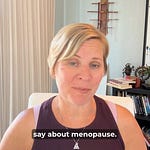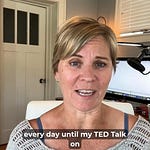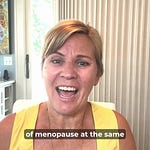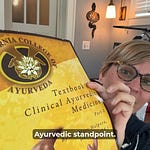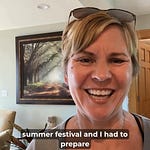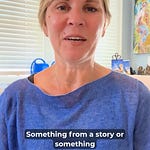My menopause share today intersects a little bit with talking about periods. It seems like where one goes, they both go. The second we start to actually see more people talking about these things, more people normalizing these very normal bodily functions and stages of life — leave it usually to women to try to shame us right back into silence.
Two articles have come out over the last month talking about how we should stop talking about periods. The first one is called, “Can We Please Stop Talking About Periods?” And the next one is, “Period Talk Needs To Stop”.
In both these articles, they, of course, also take a dig at menopause.
Here we are, working to remove these stigmas and talk about it more. And they’re right there on the front lines to say: “Stop it. Knock it off.”
We’re still in a space where 80% of women under the age of 40 have never learned about menopause. So many girls are still surprised by their period.
There are still so many things that aren’t taught to young women and girls. It’s just crazy to me that we get to this point where we’re finally seeing some movement, we’re finally seeing some public talk about this, we’re finally seeing the removal of shame and cue the women who come out and try to just shame us right back into that space.
We Are Going To Keep Normalizing This
I won’t stand for it. I won’t have it. I hope you won’t either. We are going to keep talking about this. We are going to keep normalizing it. It is only through normalization that we will get the funding, that we will get the research, that we will have the information widespread, that we will have the availability.
We all know that if men had periods, there’d be vending machines with tampons, there would be vending machines with cramp relief.
Menopause is a rite of passage. It is not just some physical set of changes. It is a rite of passage from adulthood to elderhood.
This is worthy of a conversation. This is worthy of bringing into the forefront. Yes, we can talk about it at dinner. Yes, we can talk about it in our workplaces. No, we do not have to keep it behind closed doors. And no, doctors don’t know enough. They can’t tell us everything we need to know. We need our friends. We need our family. We need our communities.
We need each other to keep pushing the envelope to not allow some of these voices to try to put us back right when we’re getting started.
If you found this helpful, please check out my book Embodying Soul: A Return to Wholeness for more insights into healing and personal evolution.
And find my podcast, Awaken Your Power, for conversations about disruption, breaking the status quo, and building a world from a place of consciousness and compassion.




